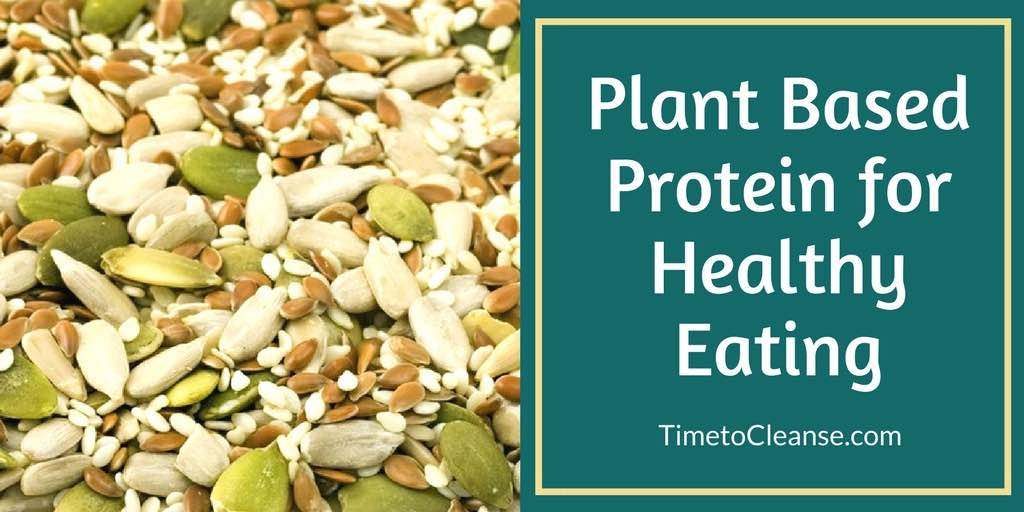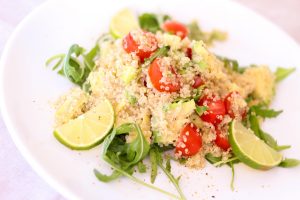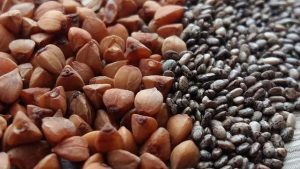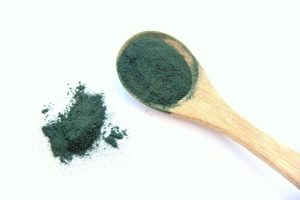
Did you know that heart disease is the #1 killer of women in the United States today? Obesity, type-2 diabetes, and other chronic diseases seem to be on the rise. Perhaps changing our diet and lifestyle can help the reduction of some of these diseases. Adding more plant-based sources of protein may help in reducing ill health. In addition, eating more foods from plants is good for the environment. It takes many more resources to raise beef, chicken, pork and other animal products than it does to raise plants.
A large percentage of land and water sources worldwide are used in raising feed for animals. According to the United Nations Food and Agricultural Organization, nearly 14% of greenhouse gas emissions stem from raising livestock. Why not raise grains, legumes and other viable edible, nutrient-dense plants to feed the human population instead? This could be better for the environment as well as contributing to healthier lives.
Quiz: Is Your Body TOXIC? Take the Test...
(get your free personalized report)
What Are The Main Culprits Contributing To Heart Disease, Obesity & Type-2 Diabetes?
Among the culprits of these diseases are poor lifestyle choices, lack of exercise, smoking, stress, and eating processed meats and foods. Eating a diet of excess saturated fats can also contribute to an unhealthy lifestyle.
Fats in our diet are a necessary and vital part of overall health and there are many conflicting ideas of how much saturated fat is good or bad for you. The American Heart Association suggest reducing the number of saturated foods in your diet to no more than 7% of your total calorie intake. If you follow these healthy guidelines of consuming saturated fats, you will still receive that necessary nutrients from animal protein sources while helping to reduce the risk of heart disease.
According to the American College of Cardiology there are plenty of studies offering evidence to support that eating a mostly plant-based diet of legumes, vegetables, whole grains, nuts and lean meats may help to improve overall heart health.
Reducing cholesterol in the body is another factor that may help to reduce the risk of heart disease. Plant sterols are naturally found in the cell walls of plants and recent studies have shown that adding plant sterols to your daily diet, may help to reduce blood cholesterol levels and may help to eliminate excess cholesterol within the body’s bloodstream. Adding a daily supplement of Isagenix Heart Shake Booster to your daily regime may be a great way to add these necessary plant sterols to your diet to help support overall cardiovascular health.
Why Do I Need Protein?
Protein is one of the major building blocks of cells, especially muscle cells. Muscles help hold our skeletal system together and as a whole, keep our bodies moving. Protein is the essential nutrient needed for building muscle.
Quiz: Is Your Body TOXIC? Take the Test...
(personalized report)
Of the three main macro-nutrients necessary for survival – protein, fat, and carbohydrates, protein not only helps to build and maintain muscle mass, it is also vital for the body to help maintain fluid balance, keeping all of our cells healthy and may help with weight management. Protein takes longer to digest in the body’s system and you may feel satiated for longer periods of time and not have hunger pangs so often.
What is the Best Way to Get High-Quality Protein Into My Diet?
Fortunately, many plant-based foods are not only high in the building blocks of protein and amino acids, some of these plant-based proteins are considered “complete proteins.” What is a complete protein you may ask? In order for the body to have the proper amounts of amino acids in the body to make quality lean muscle, you must have all 20 amino acids to form a muscle building protein.
Of the 20 different amino acids necessary for muscle building, 9 of these cannot be made by the human body and must come from ingesting them from food sources, which are found naturally in animal protein sources. In order for a food to be considered a complete protein, they must contain all of the nine essential amino acids. Adding lean meats and quality dairy products to your daily diet are an excellent way to get your complete protein.
However, research into many plants, nuts, and legumes have shown that several of these plant sources also contain all of the amino acids needed to be a complete protein. For plant sources that are not considered “complete proteins,” combining foods together, such as whole grains with beans or peas can create a complete protein.
Here Are 7 Plant-Based Sources of High-Quality Protein
Quinoa
 Quinoa has been a food staple for peoples living in the high Andes of South America for nearly 5,000 years. The Inca civilization called quinoa the “mother grain” due to its superior nutritional value.
Quinoa has been a food staple for peoples living in the high Andes of South America for nearly 5,000 years. The Inca civilization called quinoa the “mother grain” due to its superior nutritional value.
According to the Food and Agricultural Organization of the United Nations, quinoa provides 16.5 g of protein per/100g serving. In addition, quinoa contains all the essential nine amino acids needed as mentioned above. It is also high in fiber, iron, vitamin B6, magnesium and other necessary nutrients. Being a complete protein is rare in the plant world, so quinoa truly stands out as a superfood and an excellent choice of protein sources for vegans and vegetarians.
Not only is quinoa a powerhouse of nutritional value, it is very easy to cook and the cooked, grain-like seeds are super versatile as well. Cooking time is short, roughly 20 minutes and cooked quinoa can be eaten as is or added to salads, vegeburgers, or eaten for breakfast with avocado. Quinoa is high on the list of quality plant-based foods for a vegan and vegetarian diet.
Buckwheat
 Another delicious grain-like seed to add to your pantry for high-quality plant-based protein is buckwheat. Buckwheat is not a true grain but is a seed and is considered to be a pseudocereal. This is good for people who may have a gluten intolerance.
Another delicious grain-like seed to add to your pantry for high-quality plant-based protein is buckwheat. Buckwheat is not a true grain but is a seed and is considered to be a pseudocereal. This is good for people who may have a gluten intolerance.
This food staple has been popular in Asia and Eastern Europe for nearly 8,000 years and with its nutty flavor, short cooking time and versatility is a very popular food source.
Buckwheat has a protein range of 13-15% per 100 grams of serving and is rich in vitamin B, vitamin E and has high levels of magnesium, copper and soluble fiber.
Buckwheat can be used as flour for hot cakes and is used in the making of popular soba noodles. In addition, buckwheat groats are used as a cooked grain substitute. With very little gluten in buckwheat, this food source may be helpful for those who are gluten sensitive.
Chia Seeds
Chia seeds have gained in popularity recently as an overall healthy food to eat. Originally grown in the deserts of Mexico, chia seeds come from a member of the mint family called Salvia hispanica. Chia seeds were once a staple of the Aztec and Mayan diets and were given to Aztec warriors as part of their survival ration.
Chia seeds are very high in fiber and omega-3’s, calcium as well as many essential nutrients. A 100 gram serving of chia seeds gives you approximately 16 grams of protein.
Chis seeds are best added to smoothies, used as a topping for other cereals, used as a pudding when made with chia seed gel or you can even sprout them and eat them as greens.
Dairy Free Shakes
When short on time, these dairy-free IsaLean meal replacement shakes from Isagenix are an excellent choice for a satisfying and highly nutritional meal. Made with a combination of pea, hemp, and whole grain brown rice these meal replacement shakes contain a whopping 24 grams of protein per serving.
IsaLean dairy free shakes are great for vegans and vegetarians or for anyone who may have dairy sensitivities.
Spirulina
 With 57 grams of protein per 100-gram serving, spirulina is a mega-powerhouse for plant based protein sources.
With 57 grams of protein per 100-gram serving, spirulina is a mega-powerhouse for plant based protein sources.
Spirulina is a blue-green algae grown in warm alkaline waters and then freeze-dried to be used in capsules or in powder form. Isagenix Greens contains spirulina along with lots of other healthy vegetables and herbs. You can simply add a scoop of Isagenix Greens to your water bottle or mix with juice. Spirulina is not only high in protein but is an excellent source of vitamin B12 which is often lacking in vegan and vegetarian diets.
Pea Protein
Pea protein has gained recognition as an alternative source of protein in recent years. Often used in protein bars and protein powders, it is an easy way to get protein from a plant-based source.
Pea protein comes from ground yellow split peas and although they do not contain all of the essential amino acids, combined with either hemp powder or brown rice, pea protein is a good choice for a plant-based protein source.
Chickpeas
Chickpea hummus is a favorite dip and a staple food for parties and gatherings. Not only is hummus tasty but is nutrient dense as well.
Chickpeas, commonly called garbanzo beans, are in the legume family. Although not a complete protein, cooked chickpeas do contain about 9 grams of protein and are high in fiber and minerals.
Whole chickpeas can be added to soups, salads and blended to make into hummus.
Chickpea flour is a great way to add this nutrient powerhouse to homemade bread, pancakes, and other baked goods. These wonderful legumes are perfect to keep on hand in your pantry, either dried or canned and are an excellent food source for vegan or vegetarian diets.
As we all strive to improve our health and to keep our cardiovascular system strong and running smooth, keep our cholesterol levels in check and try to eliminate chronic disease in our bodies, work on adding more plant-based protein sources to your daily diet. Spend time researching recipes for tasty and delicious recipes that you and your family will fall in love with. All in all, try and adopt stress-reducing strategies into your life, exercise often (within your personal limits) reduce excess sodium, eliminate processed foods and eat more vegetables, whole grains, legumes, and fruits!
